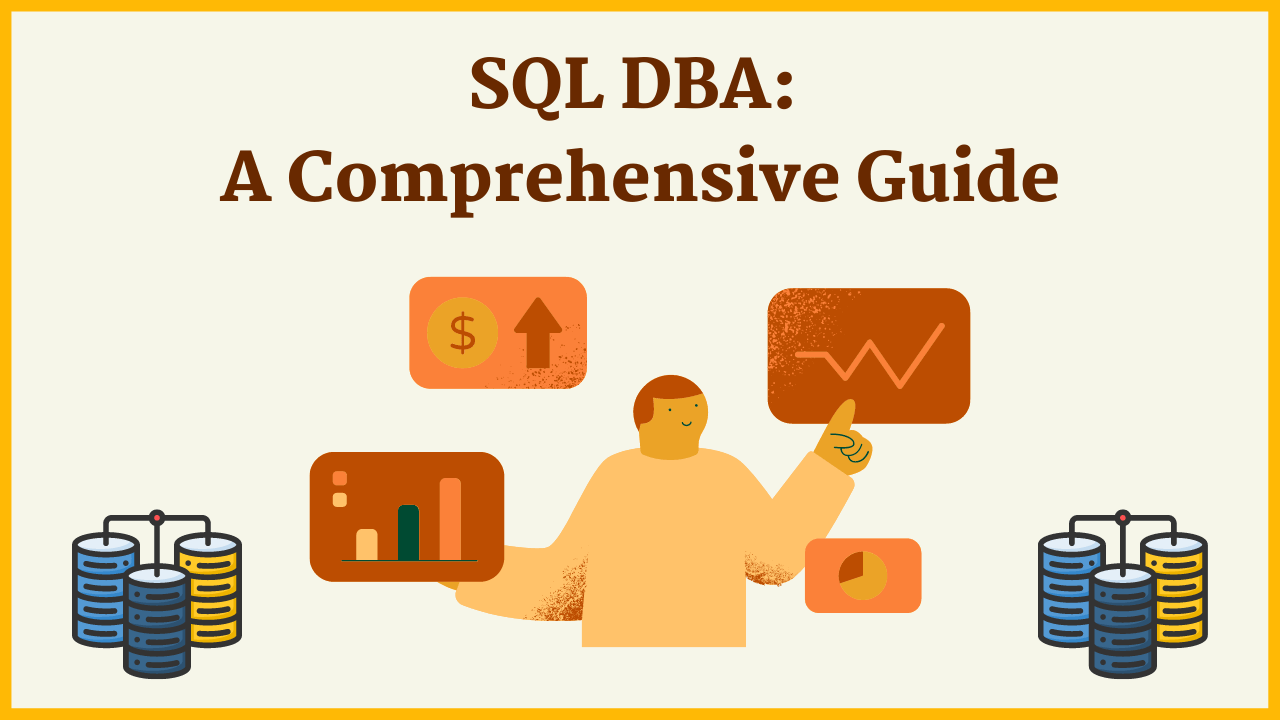In this Guide, we will explore more about SQL Database Administrator (DBA) with a Comprehensive Guide of SQL DBA Role.
SQL Database Administrators (DBAs) play a crucial role in managing and maintaining the performance, security, and integrity of relational databases.
As organizations increasingly rely on data-driven decision-making, the demand for skilled SQL DBAs continues to rise.
This article provides a detailed overview of the SQL DBA role, including responsibilities, skills required, best practices, and future trends.
What is SQL DBA?
SQL DBA stands for SQL Database Administrator.
It refers to a professional responsible for the management, maintenance, and administration of relational database systems, such as SQL Server, Oracle, MySQL, or PostgreSQL.
SQL DBAs ensure data availability, security, and optimal performance of databases by performing tasks like installation, configuration, security management, backup and recovery, performance tuning, capacity planning, troubleshooting, and collaborating with stakeholders.
They possess skills in database management systems, system administration, security, performance optimization, and problem-solving.
SQL DBAs play a crucial role in supporting data-driven decision-making and maintaining the integrity of database systems within organizations.
Understanding the SQL DBA Role
1.Role Definition
A SQL DBA is responsible for the design, implementation, and administration of database systems using SQL Server, Oracle, MySQL, or other database management systems.
They ensure data availability, security, and optimal performance while adhering to industry best practices.
2. Core Responsibilities
SQL DBAs handle various day-to-day tasks, such as:
- Installing and configuring database management systems.
- Managing database security, including user access and data encryption.
- Implementing backup and recovery strategies to safeguard data.
- Monitoring and optimizing database performance.
- Planning for database capacity and scalability.
- Troubleshooting and resolving database-related issues.
- Collaborating with stakeholders and providing database support.
- Ensuring compliance with security standards and regulations.
- Participating in disaster recovery planning and implementation.
Skills and Knowledge Required
1. Database Management Systems
SQL DBAs must have a deep understanding of one or more database management systems (DBMS) such as SQL Server, Oracle, MySQL, or PostgreSQL.
Proficiency in writing SQL queries, creating and managing database objects, and database administration tasks is essential.
2. System and Network Administration
A solid foundation in system administration, including operating systems (e.g., Windows, Linux) and network protocols, is crucial for SQL DBAs.
They need to configure and optimize database servers, manage system resources, and troubleshoot connectivity issues.
3. Security and Compliance
SQL DBAs must possess knowledge of database security principles and practices.
They should understand authentication, authorization, and encryption techniques to protect sensitive data.
Familiarity with industry compliance regulations like HIPAA, GDPR, or PCI-DSS is also important.
4. Performance Optimization
Optimizing database performance is a critical skill for SQL DBAs.
They need to analyze query plans, identify performance bottlenecks, and employ techniques such as indexing, query tuning, and caching to enhance overall database performance.
5. Problem Solving and Troubleshooting
DBAs should be adept at problem-solving and troubleshooting complex database issues.
They need to quickly diagnose problems, analyze database logs, and apply appropriate solutions or workarounds.
6. Communication and Collaboration
Strong communication skills are vital for SQL DBAs to collaborate effectively with developers, system administrators, and stakeholders.
They must understand business requirements, provide technical support, and convey complex concepts to non-technical audiences.
Best Practices for SQL DBAs
1. Regular Maintenance and Monitoring
SQL DBAs should establish a routine for database maintenance tasks such as backup, index optimization, and database integrity checks.
Regular monitoring of database performance, storage usage, and error logs helps identify potential issues proactively.
2. Documentation
Maintaining comprehensive documentation is crucial for SQL DBAs.
They should document database schemas, configurations, procedures, and troubleshooting steps.
This documentation serves as a valuable resource for knowledge sharing and disaster recovery scenarios.
3. Automation and Scripting
Leveraging automation tools and scripting languages (e.g., PowerShell, Python) can significantly streamline repetitive tasks.
SQL DBAs can automate database backups, monitoring, and maintenance processes to save time and reduce the risk of human error.
4. Continuous Learning and Professional Development
SQL DBAs should stay updated with the latest advancements in database technologies, security practices, and
industry trends. Participating in training programs, attending conferences, and joining professional communities can enhance their skills and broaden their knowledge base.
Future Trends in SQL DBA Role
1. Cloud Computing
The rise of cloud computing has transformed the way databases are managed.
SQL DBAs should embrace cloud technologies such as Amazon Web Services (AWS), Microsoft Azure, or Google Cloud Platform (GCP) and adapt their skills to manage cloud-based database solutions.
2. Big Data and Analytics
As organizations increasingly rely on big data and analytics, SQL DBAs should familiarize themselves with technologies like Apache Hadoop, Apache Spark, and NoSQL databases.
Integrating traditional relational databases with big data platforms presents new opportunities and challenges.
3. DevOps and Automation
The DevOps culture emphasizes collaboration, automation, and continuous integration/continuous deployment (CI/CD).
SQL DBAs should align with these practices, using tools like Docker, Kubernetes, and configuration management systems to automate database deployments and streamline operations.
Related Article: What is Docker Container?
SQL DBA Day-to-Day Activities
The day-to-day activities of an SQL Database Administrator (DBA) can vary depending on the organization and specific requirements, but here are some common tasks performed by SQL DBAs:
1. Database Installation and Configuration:
DBAs are responsible for installing and configuring SQL Server instances and other database management systems.
This involves selecting appropriate hardware, setting up database parameters, and ensuring optimal performance.
2. Database Security:
DBAs manage database security by creating and maintaining user accounts, granting appropriate permissions, and implementing security measures such as encryption and access controls to protect sensitive data.
3. Database Backup and Recovery:
DBAs develop and implement backup and recovery strategies to ensure data integrity and minimize downtime.
This includes scheduling regular backups, testing restore procedures, and monitoring backup performance.
4. Performance Monitoring and Tuning:
DBAs monitor database performance, identify bottlenecks, and optimize query execution.
They analyze query plans, index usage, and system resources to fine-tune the database and improve overall performance.
5. Capacity Planning:
DBAs forecast future database growth and plan for storage requirements.
They monitor disk space usage, analyze trends, and make recommendations for scaling up or optimizing database resources.
6. Database Maintenance:
DBAs perform routine maintenance tasks such as applying patches, upgrades, and service packs to keep the database software up to date.
They also manage database objects, such as tables, indexes, and stored procedures, and perform data purging or archiving as necessary.
7. Troubleshooting and Issue Resolution:
When issues arise, DBAs investigate and resolve database-related problems.
This involves diagnosing errors, analyzing logs, and applying appropriate fixes or workarounds.
8. Collaboration and Documentation:
DBAs work closely with developers, system administrators, and other stakeholders to understand business requirements and provide database-related support.
They also maintain documentation, including database schemas, configurations, and standard operating procedures.
9. Security Audits and Compliance:
DBAs ensure databases comply with security standards and regulations.
They may perform regular security audits, implement data retention policies, and assist with compliance requirements, such as HIPAA or GDPR.
10. Recovery Planning:
DBAs participate in disaster recovery planning and implementation.
They develop and test recovery procedures, maintain standby or mirrored databases, and provide support during disaster situations to restore critical systems.
It’s important to note that the day-to-day activities can vary depending on the organization’s size, the complexity of the database environment, and the specific needs of the business.
Conclusion
The role of an SQL Database Administrator (DBA) is critical in ensuring the effective management, security, and performance of relational databases.
SQL DBAs shoulder various responsibilities, ranging from database installation and maintenance to performance tuning and troubleshooting.
Possessing a diverse skill set encompassing database management systems, system administration, security, and problem-solving is crucial for success in this field.
By staying abreast of emerging trends like cloud computing, big data, and DevOps, SQL DBAs can remain at the forefront of the evolving database landscape and continue to provide valuable contributions to their organizations.

Meet Nitin, a seasoned professional in the field of data engineering. With a Post Graduation in Data Science and Analytics, Nitin is a key contributor to the healthcare sector, specializing in data analysis, machine learning, AI, blockchain, and various data-related tools and technologies. As the Co-founder and editor of analyticslearn.com, Nitin brings a wealth of knowledge and experience to the realm of analytics. Join us in exploring the exciting intersection of healthcare and data science with Nitin as your guide.










